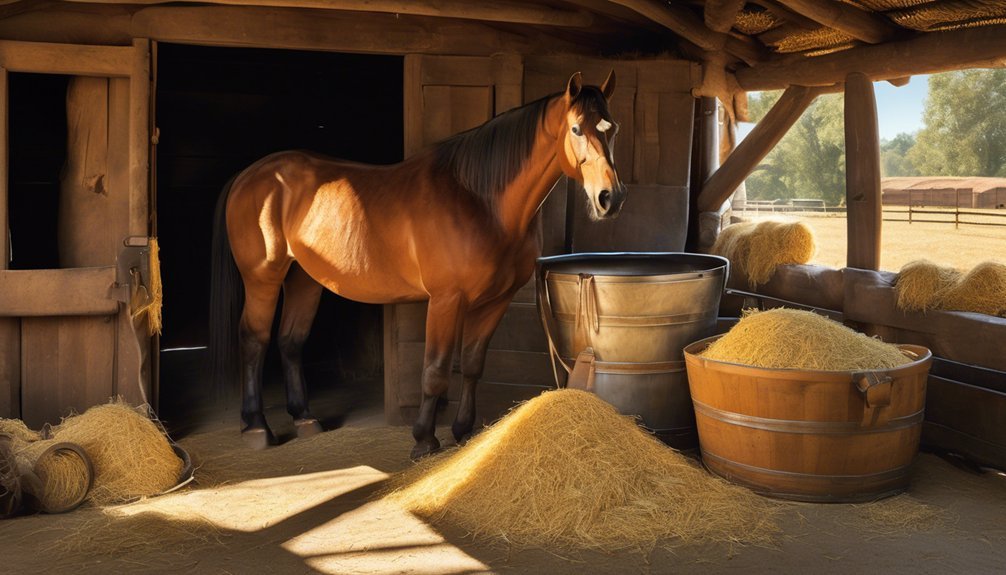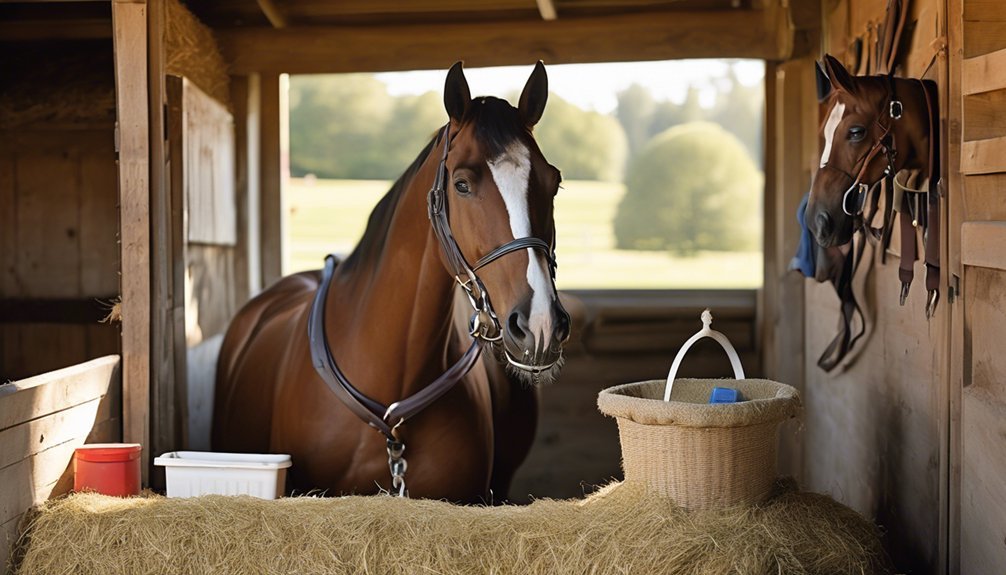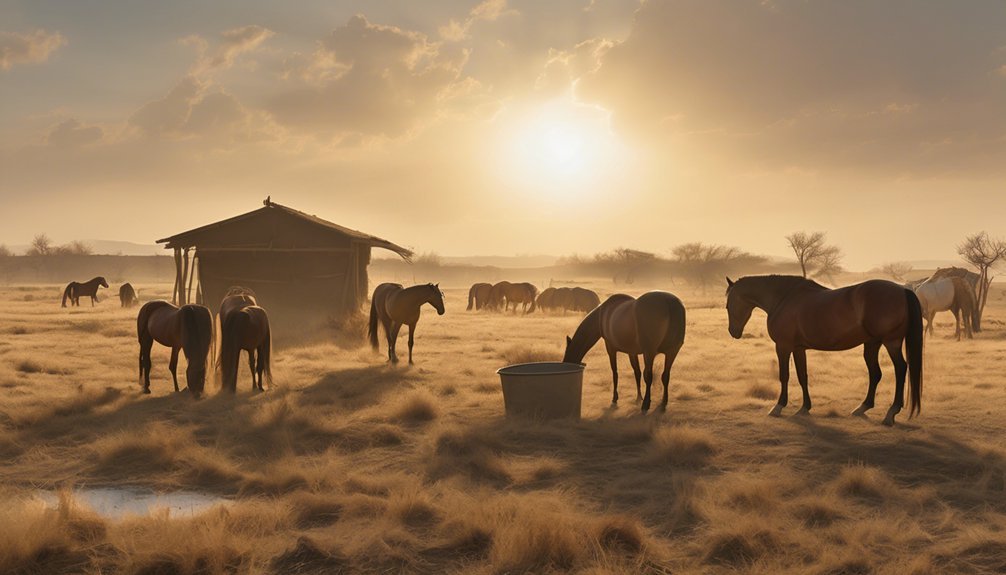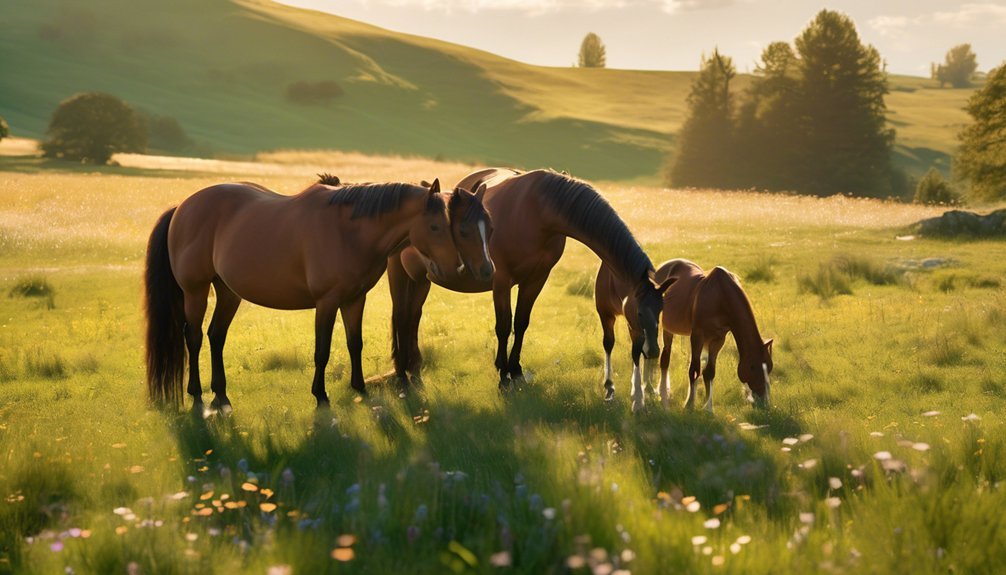
Managing a horse's diet during travel and competition is crucial for their health and performance. You need to understand your horse's nutritional requirements and select the right feeds that promote digestion while on the road. Timing meals strategically can also enhance performance. However, factors like hydration and stress can significantly impact your horse's well-being. Understanding these elements will help you make informed decisions that support your horse's needs throughout the journey.
Key Takeaways
- Provide high-quality forage and easily digestible feeds to support nutrient absorption and gut health during travel.
- Schedule meals 3-4 hours before competitions for optimal digestion and energy levels, avoiding heavy meals right before events.
- Ensure regular water access and consider electrolyte supplements to maintain hydration and electrolyte balance during travel.
- Monitor your horse's appetite and stress levels, adjusting feed amounts and frequency to accommodate their needs.
- Maintain consistent feeding routines and a calm environment to help reduce stress and support digestive health.
Understanding Your Horse's Nutritional Needs

When you travel with your horse, understanding its nutritional needs becomes crucial for maintaining its health and performance. A proper dietary balance ensures your horse receives the essential nutrients required during travel, which can be physically demanding.
Focus on providing high-quality forage, as it aids in nutrient absorption and supports gut health. Incorporating a balanced mix of carbohydrates, proteins, fats, vitamins, and minerals is vital for energy and overall well-being.
Monitor your horse's condition closely, adjusting feed and water intake based on its activity level and stress during travel. By prioritizing these nutritional aspects, you'll help your horse thrive on the road, sustaining its performance and enhancing its comfort.
Choosing the Right Feed for Travel
Choosing the right feed for travel is essential to ensure your horse maintains its energy levels and overall health.
Opt for feed types that are easily digestible, such as high-quality pelleted feeds or soaked grains. These options minimize digestive stress during travel.
Pay close attention to ingredient quality; look for feeds rich in fibers, vitamins, and minerals to support your horse's nutritional needs.
Avoid feeds with excessive sugars or fillers, as they can lead to energy spikes followed by crashes.
If you're uncertain, consult your veterinarian for recommendations tailored to your horse's specific requirements.
Timing Meals for Optimal Performance

Proper timing of meals can significantly impact your horse's performance during travel. To optimize energy levels, schedule meals to align with your competition timeline.
Ideally, feed your horse 3-4 hours before an event; this allows for digestion while ensuring ample energy reserves. If you're traveling, maintain consistent meal timing as much as possible to prevent digestive upset.
Avoid heavy meals immediately before competition; instead, opt for lighter, easily digestible options. Post-competition, provide a small meal to help with recovery, but wait at least an hour after exertion.
Importance of Hydration
Hydration is a vital aspect of your horse's health, especially during travel. Maintaining proper hydration ensures your horse's electrolyte balance, which is crucial for optimal performance. Implementing effective hydration strategies can significantly enhance your horse's endurance and recovery.
| Hydration Strategy | Benefits |
|---|---|
| Regular Water Access | Encourages consistent drinking |
| Electrolyte Supplements | Maintains electrolyte balance |
| Soaked Feeds | Increases water intake |
Always monitor your horse's water consumption, especially in stressful situations like travel or competition. Offering fresh, clean water frequently can make a difference in their hydration levels. Remember, a well-hydrated horse performs better and recovers faster, so prioritize their fluid needs.
Managing Stress and Its Effects on Digestion

As your horse travels, stress can significantly impact digestion, leading to issues such as decreased appetite and colic. Effective stress management is crucial for maintaining your horse's digestive health during these times.
Stress can trigger the release of hormones that disrupt normal gut function, reducing nutrient absorption and increasing the risk of gastrointestinal disturbances. To help mitigate this, create a calm environment, stick to familiar routines, and provide regular breaks.
Offering high-fiber, easily digestible feeds can also support digestive health under stress. Additionally, consider using calming supplements if needed.
Feeding Practices During Travel
While traveling, ensuring your horse receives the right nutrition is essential for maintaining energy levels and supporting digestive health.
To optimize travel feeding, plan your horse's meals around travel schedules. Offer small, frequent portions rather than large meals to prevent digestive upset. Keep their usual diet consistent as much as possible, incorporating familiar grains and forage to ease transitions.
Hydration is equally vital; provide water regularly and consider adding electrolytes if your journey spans several hours. Pay attention to your horse's appetite and adjust travel nutrition accordingly.
If your horse seems stressed or disinterested in food, be flexible and patient, offering palatable treats to encourage eating. A well-nourished horse is a happy horse, ready to perform at their best.
Nutritional Supplements for Competitive Edge

Maintaining your horse's nutrition during travel sets the stage for considering additional nutritional supplements that can enhance performance. You might explore various performance enhancers like electrolytes, amino acids, and probiotics.
These supplements can help optimize your horse's energy levels, endurance, and recovery. However, supplement timing is crucial; administering them at the right moment can significantly influence their effectiveness.
For instance, providing electrolytes before and after strenuous activities can prevent dehydration and maintain peak performance. Always consult with a veterinarian or equine nutritionist to tailor the supplement plan to your horse's unique needs.
Monitoring Your Horse's Condition on the Road
Monitoring your horse's condition on the road is essential for ensuring its health and performance during travel. Regular condition assessments can help you identify any changes in your horse's travel behavior, which may indicate stress or discomfort.
Observe vital signs, including heart rate and temperature, alongside body condition and energy levels. Check for signs of dehydration, as this can greatly affect performance. Pay attention to eating and drinking habits; a decrease could signal an issue.
Frequent breaks during long journeys give your horse the chance to stretch and relax, enhancing its overall well-being. By staying vigilant and proactive, you can maintain your horse's optimal condition, ensuring it arrives ready and able to compete at its best.
Adjusting Diet Post-Competition

After a competition, adjusting your horse's diet is crucial to support recovery and maintain optimal health. Focus on post event recovery by gradually reintroducing their regular diet. This helps to avoid digestive issues and ensures your horse adapts smoothly after the stress of competition.
| Step | Action |
|---|---|
| 1 | Offer small, frequent meals |
| 2 | Reintroduce forage slowly |
| 3 | Monitor hydration closely |
| 4 | Adjust grain based on activity |
| 5 | Evaluate overall condition |
Frequently Asked Questions
How Can I Prevent My Horse From Overeating While Traveling?
To prevent your horse from overeating while traveling, establish a consistent travel routine. Implement portion control by measuring feed accurately, ensuring balanced nutrition, and monitoring your horse's intake to maintain optimal health throughout the journey.
What Should I Do if My Horse Refuses to Eat During Travel?
If your horse refuses to eat during travel, don't panic! Assess travel stress, and try enticing feeding strategies, like offering favorite treats or wetting feed. Familiar scents can soothe and encourage your horse to eat again.
Are There Specific Foods to Avoid Before a Competition?
Before a competition, avoid high fiber foods that can upset your horse's stomach and sugary treats that may cause energy spikes. Stick to balanced meals that provide steady energy and maintain focus during the event.
How Can I Identify if My Horse Is Dehydrated?
Think of dehydration as a wilting flower. You'll spot dehydration symptoms like dry gums, sunken eyes, and reduced skin elasticity. To ensure proper hydration, offer fresh water frequently and consider electrolyte supplements for optimal health.
Can Travel Affect My Horse's Weight Management?
Yes, travel can lead to weight fluctuations in your horse due to travel stress. Changes in routine, limited access to food, and anxiety can all impact their weight, so monitoring is essential during trips.
Conclusion
In the journey of competition, your horse's diet acts as the foundation of their performance, much like the roots of a tree that nourish its growth. By understanding their nutritional needs, choosing the right feed, and timing meals wisely, you ensure they thrive under pressure. Keeping them hydrated and managing stress is crucial, too. Remember, a well-fed horse is a spirited partner, ready to gallop toward victory with you, the wind in their mane and the taste of triumph in their stride.





